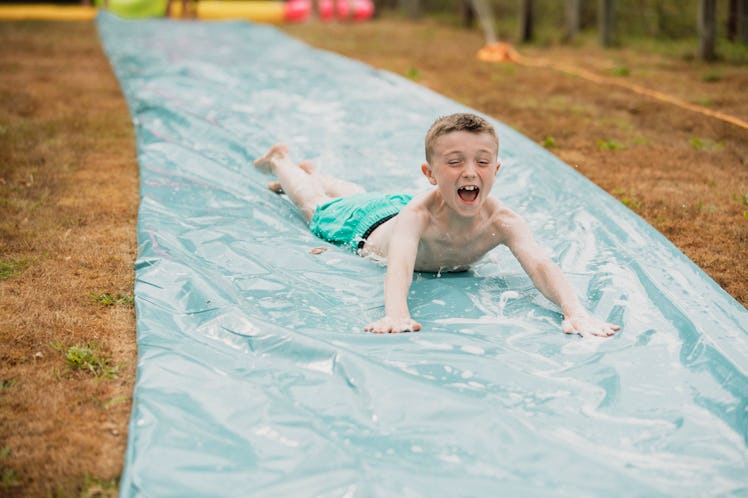How to Build An Insane Backyard Slip-And-Slide In 3 Easy Steps
This will cost less (and last much longer) than one you'd buy from the store.

At their best, slip-and-slides are exhilarating, fast, safe, and fun, the perfect way to keep kids cool on a hot summer day — there’s nothing better than having a water slide set up in the backyard. The problem, of course, as most parents quickly learn, is that most store-bought Slip ’N Slides are either just way too short or too cheaply made to last the summer. In fact, most are so thin, they tend to fall apart after only a couple slips and slides. For summer 2021, what you need is a homemade slip-and-slide, built to your specifications and ready to go in under an hour.
The good news is that it’s not hard at all to custom-build the perfect backyard water slide. You just need to be a little brave. With the best materials and the right dimensions, pretty much anybody can build a massive homemade slip-and-slide that dwarfs almost any off-the-shelf Slip ’N Slide. You will need a roll of thick plastic, a few tent stakes or garden staples, and a water hose. It takes about 30 minutes to an hour and, depending on the size, should cost around $50 to $60. Here’s how you do it. Step… by step. (Do these steps in order! Don’t slip or slide ahead of yourself!)
What You’ll Need For ADIY Slip-and-Slide
- A 10-foot by 100-foot roll of heavy 6 mil plastic from the local hardware store or Amazon. Obviously, you can go smaller in size but the amount of fun is directly proportional to the length and width of the plastic, remember that. Whatever you do, though, don’t buy thinner plastic ⏤ it tears more easily and that defeats the entire purpose of building your own slide. Also, black plastic gets hot. White is more expensive. And clear may kill your lawn. You decide which color is a bigger drawback.
- One 10- to 12-foot long 2-by-4 board
- Garden staples and/or tent stakes
- Garden hose or lawn sprinkler
- Bottle of baby shampoo
- Optional: Drill, hammer, and a large pool noodle
Find the Perfect Spot For Your Slip-and-Slide
Obviously, the size of your slide depends on the size of your yard. We recommended a 100-foot piece of plastic ⏤ because that makes for a long, fun glide ⏤ but if a plastic sheet that long cuts across three of your neighbor’s lawns, go smaller (or roll it up). Nonetheless, you’re looking for the longest stretch of open grass, preferably on a hill, you can find ⏤ the steeper the incline, the wilder the ride. That said, a flat surface usually works just fine ⏤ even better when you add a little baby shampoo to the water.
No matter the spot, though, the most important thing you can do is remove any rocks, sticks, or obstructions from the full length of the glide path. Walk it once, twice, three times, whatever it takes to ensure nobody smashes mid-slide into a tree root hidden underneath.
Unroll The Plastic & Secure The Ends
After picking a spot, unfurl the plastic sheet and straighten. Make sure it’s stretched taut and the wrinkles are smoothed out. You have two options for securing the slide:
- The easiest is simply to stake down all four corners with tent stakes or garden staples, bunching the plastic a little to keep it from tearing every time somebody hits the slide. Garden staples are nice because they have slightly rounded tops and leave no exposed metal. Tent stakes, on the hand, extend deeper and may provide a more secure hold ⏤ just make sure they’re hammered all the way down so that nobody accidentally gets cut.
- The second way to secure the slide is to roll the end of the plastic around a two-by-four board, which is then secured into the ground with two metal tent stakes. This method provides the most secure hold for the top of the slide. Simply lay a 10- to 12-foot board along the edge of the plastic sheet. Wrap the plastic around the two-by-four several times and pull tight. Now drill a hole on each side of the board and hammer a tent stake through each so it doesn’t move. Similarly, some people like to wrap the bottom of the slide in a giant pool noodle to help slow down the sliders when they hit the end.
Add Water And Shampoo
With the slide in place, you’re just about ready to go. Either set up sprinkler(s) along the runway or turn the hose on at the top of the slide and run the water until it’s completely soaked. Depending on the desired speed of the slide, have the kids do a couple of test runs to see how fast the surface is. If it’s too slow, simply pour some baby shampoo the length of the plastic. Not only is it an effective lubricant, but it’s better for the environment than, say dish soap, and it won’t burn the kid’s eyes.
Go Nuts With Your Homemade Slip-and-Slide!
Seriously, that’s it. Line the kids up and let them go wild as they slip and slide. Just remember one rider at a time and no standing, dammit!
This article was originally published on